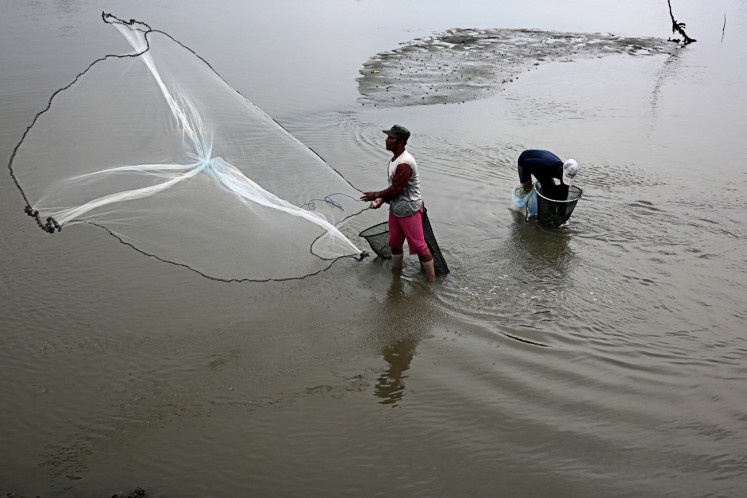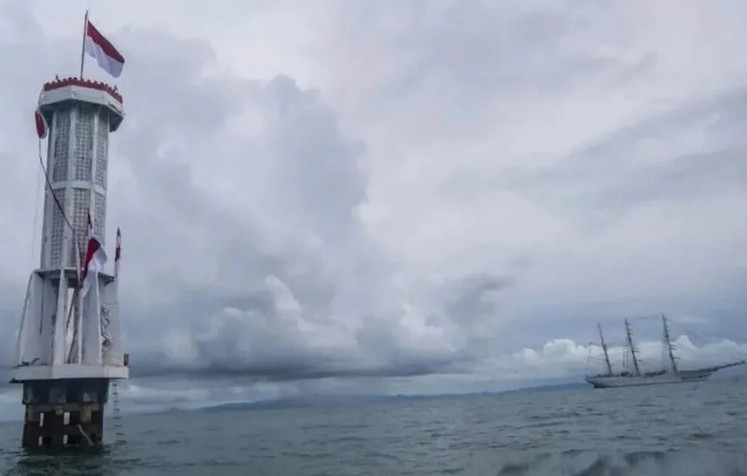Popular Reads
Top Results
Can't find what you're looking for?
View all search resultsPopular Reads
Top Results
Can't find what you're looking for?
View all search resultsEros Djarot: Makes a comeback with new album
For a veteran musician, making a comeback to the stage might be similar to riding a bike: Once you've learned how, you never forget it
Change text size
Gift Premium Articles
to Anyone
For a veteran musician, making a comeback to the stage might be similar to riding a bike: Once you've learned how, you never forget it.
While other musicians might choose a more common and mainstream sort of music for a comeback, acclaimed songwriter Eros Djarot decided to "take his bike" down a different course.
"I wanted this album to be different from my previous ones, so I used a full-orchestra by Magenta Orchestra with the songs. Classical pieces inspire me," Eros said recently while promoting his latest album, Karena Cinta, Kita Ada (Because of Love, We Exist), at the Buddha Bar in Central Jakarta.
Born in Rangkasbitung, Banten, on July 22, 1950, Eros has received the Citra award, a local version of an Academy Award, for making movie sound tracks, such as for the film Kawin Lari (Elope, 1976), Secangkir Kopi Pahit (A Cup of Bitter Coffee, 1986), Usia 18 (Age of Eighteen, 1981) and Ponirah Terpidana (The Convicted Ponirah, 1984).
His most praised and well-known works include the sound track of hit movie Badai Pasti Berlalu (The Storm Will Pass, 1977). The movie and the sound track became such a legend that in 2007, director Teddy Soeriaatmaja made a remake version.
Eros has also directed several movies such as Tjoet Nja' Dhien (1988) and worked alongside Gotot Prakosa in Kantata Takwa (2008). Tjoet Nja Dhien won nine Citra awards, while Kantata Takwa received the Golden Hanoman in the 2008 Jogja-NETPAC Asian Film Festival.
The road has not been all clear for Eros. Last year, work on his latest movie Lastri came to a grinding halt due to threats and intimidations from groups who claimed the movie would spread communism. In the 1990s, Eros established Detik tabloid, but the Soeharto government later shut it down due to its content.
Besides expressing himself through songs, Eros also voices his thoughts through politics. He started his political career through the Indonesian Democratic Party (PDI). After having a disagreement with former party head Soerjadi, Eros quit PDI and formed the Indonesian Democratic Party of Struggle (PDI-P) with Megawati Soekarnoputri.
Despite PDI-P winning the 1999 election, Eros left the party and in 2002 formed a new party called Bung Karno National Party (PNBK). The party later became Freedom Bull National Party following a law banning the use of any person's name and photo as a party ideology.
After trying his hand at various fields, Eros said that he felt most in his own skin when writing songs. Therefore, he added, he wrote songs that best describe his feelings.
"I make music because I love doing it. I've never thought about making my albums commercial. If an album is not a success, I consider it enrichment to the Indonesian music charts," he said.
"If all musicians just made music for the market, Indonesian music would have no variety."
For its arrangement, Eros recruited Andi Rianto as the album's musical director. Andi previously worked on the sound track for the 2007 remake version.
"There are things that I like and things I dislike about Andi's arrangement on the 2007 version, but I see potential in him," Eros said.
Andi said he was honored to be able to work with Eros. "Pak Eros is open to new ideas and is easy to work with," he said.
Andi said the concept of the album was evergreen and long lasting. He is optimistic about it, because it incorporates good music and lyrics, creating melodious and harmony-rich songs.
The album will have 11 songs; each was inspired by Eros' daily musings and the experiences of his friends and family. For example, "Bunga Sedap Malam" (Tuberose) tells about Eros' imaginary meeting with Indonesia's first president Bung Karno, while "Sendiri Menembus Malam" (Going through the Night Alone) expresses his apology to his wife for coming home late at night.
As for the singers, Eros features new artists, such as Lucky Octavian, Annisa BV and Farman Purnama, and includes a well-known singer from the 1980s, Berlian Hutauruk, and Eros' brother Slamet Rahardjo.
"It's not nepotism, I personally think it's Mas Slamet who can embrace the spirit of *Sendiri Menembus Malam'," Eros said.
Poppy S Hanadhy, assistant director for Magenta Orchestra, said she was still in the middle of negotiations with the recording company over the release date.
"We will be having general elections in April. I think every Indonesian will be busy with this national event. Perhaps the album will be released by the end of February. We're still negoti-ating with Aquarius, the recording company," she said.
"The master album is finished. We only have to design the cover and pick the photos."
Although the orchestra music requires a state-of-the-art recording process, Eros chose to make the album in Indonesia. "I wanted to show people that we can make such an album here," he said.










